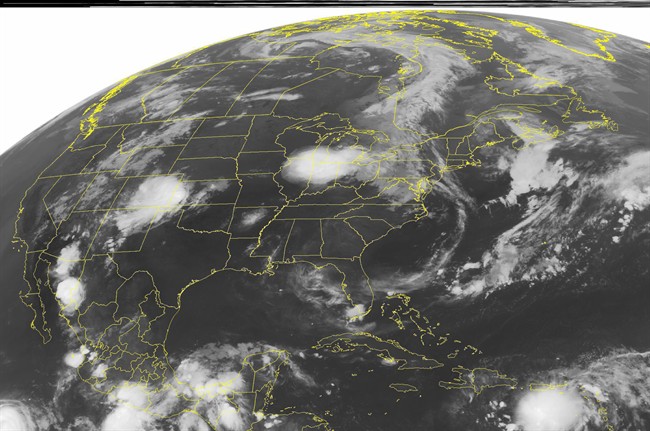PORT-AU-PRINCE, Haiti – Rain-packed Tropical Storm Emily brushed past Puerto Rico and headed Wednesday toward the Dominican Republic and Haiti, where more than 630,000 people are still in tents and flimsy shanties after last year’s earthquake.

Forecasters said the centre of the storm was expected to pass over the southwestern corner of the Dominican Republic late Wednesday and is likely to weaken somewhat in the high mountains that divide the country from Haiti. But intense rain poses a threat, said Diana Goeller, a meteorologist with the U.S. National Hurricane Center.
“This storm has a lot of heavy rainfall with it,” Goeller told The Associated Press. “So in those mountainous areas, there could be very dangerous, life-threatening mudslides or flash floods.”
The worst rainfall is expected to miss the Haitian capital, but it could be enough to cause severe flooding and increased misery. A U.N. aid group distributed cholera prevention kits to help fight the waterborne disease, and the government set up a network of shelters.
Francois Prophete, who was shoring up the steel roof of his one-room cinder block home, said most people had few options in a nation where the vast majority are desperately poor. “We can’t afford to do much,” he said.

Get daily National news
Michel Davison of the U.S. National Oceanic and Atmospheric Administration said parts of the Dominican Republic could see up to 20 inches (50 centimetres) of rain within 36 hours. Up to 10 inches (25 centimetres) is expected in rural Haiti and up to 6 inches (15 centimetres) in the capital.
The storm had already dropped up to 10 inches (250 millimeters) of rain in parts of Puerto Rico, though it never got within 100 miles (160 kilometres) of the island, the U.S. National Weather Service said.
Forecasters expected the mountains on Hispaniola to weaken the storm but still issued warnings for parts of Cuba and the Bahamas.
Civil defence officials and the military in the Dominican Republic began moving people out of high-risk zones ahead of the storm.
In Haiti, local authorities urged people to conserve food and safeguard their belongings and prepared a fleet of buses to evacuate people from flooded areas. The United Nations peacekeeping force in the country told its 11,500 troops to be on standby to aid. The International Federation of Red Cross and Red Crescent Societies told emergency teams to be ready. They have access to relief supplies already in place for up to 125,000 people throughout the country.
A slow-moving storm that triggered mudslides and floods in Haiti killed at least 28 people in June.
The U.S. National Hurricane Center said the storm was heading west at 14 mph (22 kph) late Wednesday morning, and it was expected to veer later toward the northwest. The storm was about 120 miles (190 kilometres) south-southeast of Santo Domingo, capital of the Dominican Republic. It had maximum sustained winds of 50 mph (85 kph).
A tropical storm warning was in effect for the Dominican Republic, Haiti, the southeast Bahamas, eastern parts of Cuba and the Turks and Caicos Islands.
____
Associated Press writers Ben Fox in San Juan, Puerto Rico, Ezequiel Lopez Blanco contributed from Santo Domingo, Dominican Republic and David McFadden in Kingston, Jamaica contributed to this report.








Comments